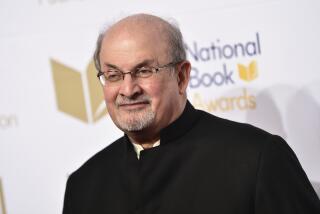China’s Writers Tell of Literary Freedom, Say It Still Has Limits
- Share via
PEKING — Several of China’s leading writers said Wednesday that their country now enjoys a vastly expanded literary and artistic freedom, but they acknowledged that this freedom still has its limits.
Speaking at a rare press conference after an eight-day nationwide literary convention here, the writers praised China’s current political leadership for allowing them greater independence. They said that the new freedom will not lead to any outpouring of works critical of the government.
“As far as I know, no writers will oppose the government, because all writers agree that the present government is a good one,” said Liu Binyan, 59, who was elected a vice chairman of the Chinese Writers’ Assn.
Another writer, Wang Meng, was asked what might happen if a Chinese author decided to publish a work lauding the imprisoned Jiang Qing, the widow of Mao Tse-tung and one of the principal architects of the Cultural Revolution.
“If a writer writes a book praising Jiang Qing, OK, let’s imagine the aftermath,” Wang answered. “The mass media would criticize him (the writer). When he walked on the street, people would spit on him. . . . (So) the publishing houses would not publish such a work.”
Some diplomatic analysts here said they view the events of the writers’ conference less as a victory for literary freedom than as another skirmish in the larger struggle between right-wing and left-wing forces in Chinese politics.
“It’s clear the boundaries of artistic freedom have been relaxed a little,” one analyst said Wednesday. “But there was a lot of politics as usual. The millennium it’s not.”
This diplomat, like others, said he considers it significant that Communist Party propaganda chief Deng Liqun, who spearheaded the “spiritual pollution” campaign against Western influences a year ago, did not attend the writers’ conference. He was said to be ill.
The most important speech to the conference was given by Hu Qili, a high-ranking Communist Party official who coupled a call for greater freedom of expression with an appeal to the writers to oppose “leftist” tendencies.
In 1957, Mao encouraged Chinese writers to voice their criticisms of the government and the Communist Party, saying he favored “letting a hundred flowers bloom and a hundred schools of thought contend.” Soon afterwards, in a stunning reversal, the regime labeled as “rightists” many of those who had followed Mao’s advice--Liu and Wang among them--rounded them up and sent them to prison or labor camps.
During the congress that finished Wednesday, the writers’ group adopted a new charter that once again embraces the goal of “letting a hundred flowers bloom.”
The writers at the press conference insisted that this time the call for artistic freedom in China is genuine, and that there is little fear that writers may be punished for expressing unconventional views.
“It’s possible that at some time in the future, a high leader will say he doesn’t like a certain novel or story,” Liu said. “But there are also people who will express opposite ideas, and they (political leaders) will accept these ideas. . . . A lot of things will be solved through discussion.”
The writers said Wednesday that they believe authors may now publish anything within the limits of Chinese law. “If it does not go against the constitution and laws of the People’s Republic of China, it’s OK to publish,” Wang said.
More to Read
Sign up for our Book Club newsletter
Get the latest news, events and more from the Los Angeles Times Book Club, and help us get L.A. reading and talking.
You may occasionally receive promotional content from the Los Angeles Times.









